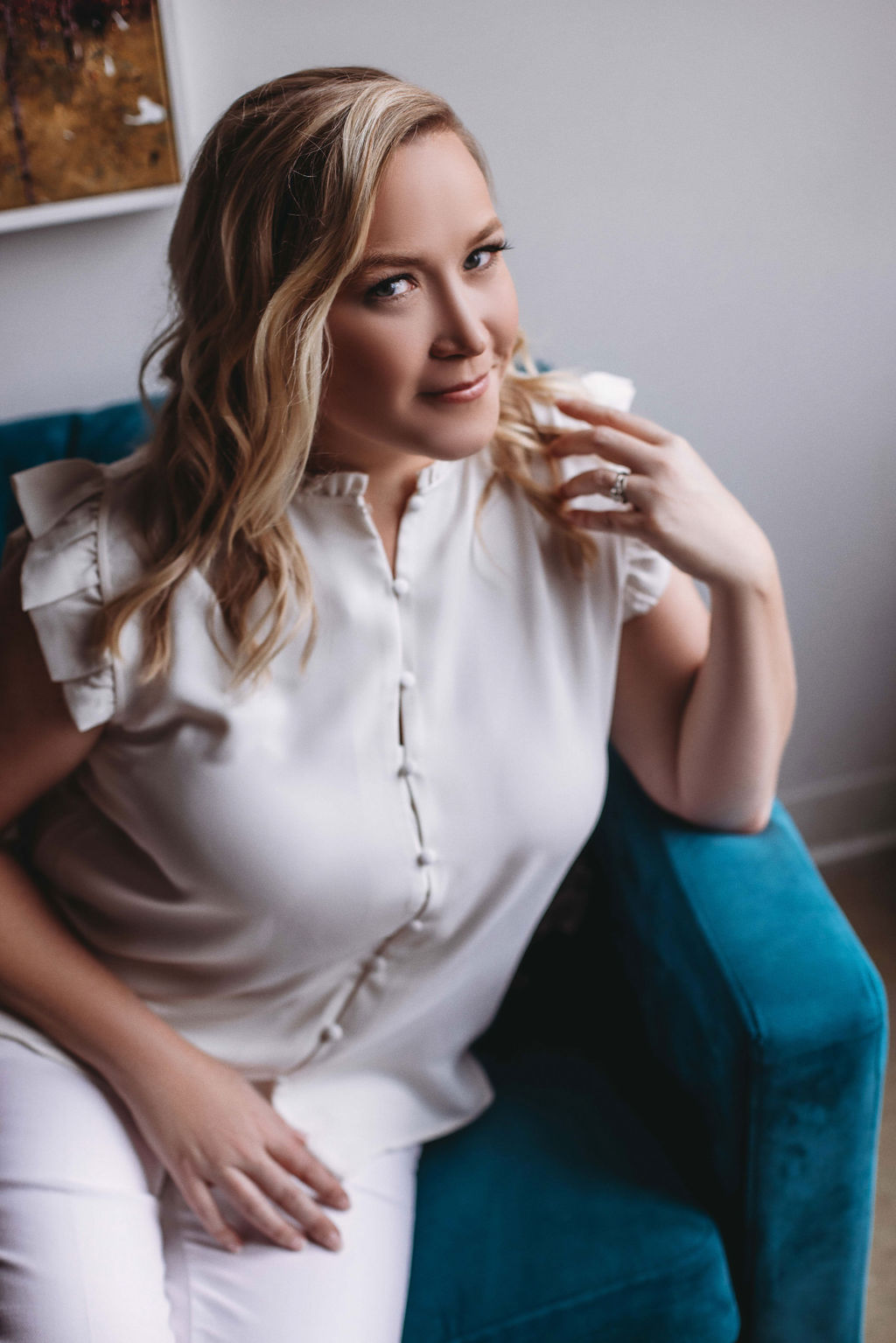[00:00:00] Speaker A: We don't know the answer, but we'll do our best. Bonus episode, we're going to be talking about how much sex is normal.
[00:00:08] Speaker B: We discuss Shan Boodram's belief of the amount of sex of whoever wants sex the least is the amount of sex that's normal. If that's two times a month, then it's two times a month. And if you want to change that, then change how you want to have sex with that person.
[00:00:23] Speaker A: In this sensational sex podcast episode, you'll find out how research shows that more sex doesn't affect overall relationship happiness.
[00:00:35] Speaker B: We'll uncover why the Goldilocks standard for sexual happiness is sex once a week.
[00:00:41] Speaker A: Why? If you don't have spontaneous desire, responsive desire, or want compassionate sex, then you probably shouldn't be having sex. Welcome to the Sensational Sex podcast, where we help women in long term relationships thrive after the honeymoon stage is over.
Are you a woman who wants a deep, intimate, and satisfying connection with her partner? Of course you do.
Amy Rowan and doctor Trina Reid have the answers, and all you have to do is join us each week.
Soon you'll be that woman who effortlessly has a satisfying sex life.
Follow us on social media at Sensational Sexpodcast share this episode leave a review and thank you for subscribing. Now let's start the show.
We are thrilled to partner with Xenz, who are all about making your sensual experience the best it can be.
[00:01:47] Speaker B: Xenz has an amazing fall in love giveaway valued at over $700, and we'll tell you more about that halfway through our podcast.
[00:01:58] Speaker A: Wow. Xenz really is a wonderful brand.
[00:02:02] Speaker B: We love what Xsenz is doing for your sensual and sexual experience. I'm Amy Rowan. Thank you for listening to the sensational sex podcast. We are so happy for you to have come along on this ride with us.
[00:02:16] Speaker A: Hi everyone. I'm doctor Trina Reid, and even though your sex life will never be perfect, you can create the sex life that is perfect for you. And we are here to help you with that.
[00:02:26] Speaker B: Yes, we are. Once a month, we are going to do a bonus sex question.
[00:02:34] Speaker A: Bonus? Who doesn't love a bonus?
[00:02:36] Speaker B: Yes, absolutely. I grew up in Louisiana and there is a fun word. I don't know if you know this one, Doctor Trina. That means a little something extra. And the word is lanyap. We're having a little lanyap.
[00:02:47] Speaker A: Okay, I'm going to try and say that. Langyap.
[00:02:50] Speaker B: Lagniappe. Yes, it's a french word, I believe.
[00:02:54] Speaker A: Maybe Cajun I think that's Cajun. Yes, because I'm bilingual in French. I've never heard that word before.
[00:03:01] Speaker B: Yeah, probably Cajun, then.
[00:03:03] Speaker A: Probably Cajun. It's a spicy word.
[00:03:05] Speaker B: Yes.
[00:03:06] Speaker A: I'm always looking forward to the new research and studies that are coming out, and I forget that people need us to cover the basics, too.
[00:03:15] Speaker B: What are some of the most common sex questions that you get?
[00:03:19] Speaker A: Doctor Trinade, I've been doing this for 25 years and you would think with all the changes that have happened, things would be different. Questions would be different. But I am getting the same questions from young ladies that I did 25 years ago. A common question is how do I find the g spot? Whenever I'm doing a seminar, the women are like, g spot, g spot.
How much sex is normal? And that's a very common one. What about you? What are the common questions that you get?
[00:03:51] Speaker B: I just get various versions of am I normal? Is what I want normal? Is my body normal? Is my relationship normal? There's all these different variations of am I normal?
[00:04:03] Speaker A: It's a tough topic because we are unique individuals and what we all want and desire is different. And trying to come up with a common denominator of what is normal. There is no normal. And they have tried to do studies on what is a normal amount of sex and they can't come to a conclusion. In this I saw this very interesting Instagram post by fellow canadian Shannon Boudrem, who is the author of the Game of Desire. She's a popular YouTube personality and intimacy expert, and in this Instagram video, she defended her stance on how much sex is normal. I'm going to link both Shannon's book and and this Instagram post in the description below so you can take a look.
[00:04:49] Speaker B: Yes, that will be in the show notes, but we'll tell you what you see. So the video starts with a man and he's asking a panel of sex experts how much sex is realistically normal in a marriage. Shannon, she responds with the amount of sex of whoever wants sex the least. And if that's two times a month, then it's two times a month. And if you want to change that, then change how you have sex with that person. Love them more, do more chores around the house. It's up to the partner who wants it more to make it more interesting.
[00:05:28] Speaker A: What was interesting about that Instagram post is you could see the people in the crowd uttering. But what surprised me, the other people who were on this panel was Shannon Boudreaum were shaking their heads, shaking their heads now like they were agreeing with what she had to say. And I believe this post went viral and there were a lot of interesting comments in the comment section. If you have a chance and you're interested, you can go to the comment section, but we can read some of those comments.
[00:05:58] Speaker B: Let's read some of them. So one commenter said, what we don't talk about enough is sexual compatibility between married couples. There are so many factors that contribute to high sex drives or low sex drives.
[00:06:13] Speaker A: Another commentator said, what I don't like about this approach is my fear that the spouse who wants it more is lazy and will step out with someone they perceive to automatically desire them because they may think their own partner doesn't. Unfortunately, I've seen people cheat for similar reasons.
[00:06:32] Speaker B: Another commenter said, what I love about your approach is that it is solution based for a couple to grow together and actually problem solve when there is a disconnect rather than ignoring it, mandating that one partner perform when they don't feel like it or want to and they are actually seeking solutions to ensure the needs of both spouses are met. I really like that.
[00:06:53] Speaker A: Another commenter said, marriage takes work and some of the work will be motivating our partners towards mutual goals and mutually beneficial goals. This approach lays out some of that work.
[00:07:05] Speaker B: Another commenter said, the frequency should be organic, loving and desired by all parties involved. Your answer is a healthy, honest, helpful one.
[00:07:18] Speaker A: People not having seen this Instagram post by Shannon Boudrem, I really liked how she approached it and I really like that she stuck to her gun. Knowing what I know as a sexologist, but also being married for 22 years, I think she's pretty spot on.
[00:07:38] Speaker B: I agree. And what one of the commenters pointed out about the problem solving approach, I think that was one of the most powerful parts of this, because often what happens in these types of situations is there's just a no no, just stops things. And so it is acknowledging the challenge that one person of the couple is experiencing and it's also giving an ongoing, evolving solution. And I really thought that that was very clever.
[00:08:07] Speaker A: Yeah. Back to Shannon's Instagram post. Shannon went on to discuss Karen Gurney's book Mind the Gap, where Karen Gurney talked about spontaneous desire and responsive desire. Spontaneous desire is when somebody initiates sex, they give you a cue and you are instantly turned on. Or you look at your partner and they give you a look and you're instantly turned on. There is that spontaneous desire. And the thing is, as our relationships progress, the longer women are in relationships, the less she will experience a spontaneous desire. Spontaneous desire becomes a delayed response.
[00:08:47] Speaker B: And that delayed response or responsive desire, that is when somebody needs to feel aroused before they feel desire. And that's the type of desire that most women typically experience most of the time. And to be clear, this isn't static. This shifts. This can shift over the course of a woman's lifetime, over the course of a week, because things do change. But that responsive desire, a good example of that would be perhaps you're not, you're not in the mood, you're not thinking about sex. That's not even remotely on your mind. But maybe you've just read a little bit of erotica, or maybe your partner just gave you a back massage or something along those lines, and you started to feel that arousal, and then the desire turned on.
[00:09:34] Speaker A: A lot of times with responsive desire, you actually have to sex initiated. You don't feel like having the sex because your desire's been delayed and it's perfectly normal, but you have to put your body into the motions of sex. So whatever that looks like, if it's reading erotica, if it's lighting a candle and smelling the candle, if it's putting on some lingerie, these are things that we call foreplay. But actually it's really just getting, it's just gearing you up. It's just moving your delayed response along. You're responding to that with a responsive desire, which is helping you to awaken your arousal and desire.
[00:10:10] Speaker B: Yes. And then Shannon goes on, and she discusses compassionate desire. And this is where you have sex. You're starting to have sex, you're starting to play with your partner. And midway through, maybe you still aren't feeling it. Maybe you still really aren't wanting it yet, but you want to see your partner happy. And the joy of compersion. Compersion is just another big, fun, fancy word of saying seeing somebody else happy and you're willing to do this with them. And that benefit of seeing your partner happy outweighs the cost of not actually wanting sex.
[00:10:49] Speaker A: I've met many women who really enjoy seeing their partner's happiness. Like, that's, that's their gen.
[00:10:59] Speaker B: It's.
[00:10:59] Speaker A: It's wonderful if you're that kind of person. It's not for everybody, but I think there's enough women out there that really enjoy seeing their partner doing themselves.
[00:11:09] Speaker B: Yeah. And I think what this also speaks to is there's many reasons why we have sex. Well, sometimes it's because we have the time to carve out this big, amazing, fun, passionate experience. Sometimes it's just for connections, and sometimes it is this compassionate desire. Sometimes it's compassionate sex. Now, is this something that should be how you're having sex all the time? Probably not, but being able to have that as a little part of the repertoire for the many reasons why we have sex. I liked her inclusion of this concept of compassionate desire.
[00:11:46] Speaker A: Yeah. And then Shannon then goes on to discuss goal oriented sex, which is different from my own definition. And what she talks about is when you don't want to have sex at the start, but you like the end result, you're looking at how you're going to feel on the other side of this in 15 minutes and how this is going to benefit your relationship. So you accept the trade off. And I resemble this remark for me, sometimes when I'm not in the mood, I just think I'm not in the mood now, but I know when we're done, I'm going to be great and this is going to be great. And when I get to this other side, it's going to be a much different situation. I really resonate with that because when I don't feel like it, I'm like, well, what's going to happen during this? That's going to help me feel better afterwards?
[00:12:29] Speaker B: Yes, absolutely. I resonate with this as well. In fact, I gave an example of this earlier on the podcast of motivate me, where I was just, I'm not, no, I'm really not in the mood right now. But I know, to your point, at the end of this, I know I'm not going to regret having sex. I know that if I go ahead and I say yes, let's get going and things get moving and we start having fun, that I know at the end of it, I'll be glad that we did it. I know it'll be fun. I know we'll be snuggling. I know that I'll sleep better. I know all of these good things.
[00:13:01] Speaker A: And so a couple dynamics are better. The way you treat each other is better. You take 15 minutes and suddenly your relationship is just a little more sparkly. And it didn't take a whole lot of effort. I'm going back to mindset, but it's just a shift in that mindset where you're looking at it in a new way.
[00:13:20] Speaker B: Yeah, well, looking for reasons to say yes. Because if you're continuously looking for reasons to say yes and you are saying yes, then in those times when you really, really are deeply exhausted or whatever it is, those no's are not going to hurt or feel like rejection in the same way that they would if there had not been a lot of yeses around. That canon goes on to say that if none of these three things, spontaneous desire, responsive desiree or compassionate sex or not happening, then you should not have sex.
[00:13:56] Speaker A: The person who wants sex more often needs to find the pain point and address it. So sensual, enthusiastic sex is the only sex we should consider. And I think that's a nice to have this idea that the partner has to seek out and find out what the pain point is. That was the only time that I was like, yeah, nice. In theory, I don't think that's going to happen, but otherwise I feel like Shannon Beaudrum was completely spot on.
[00:14:24] Speaker B: Yeah, well, and I agree. I think it should be more of a collaborative effort because I think sometimes what could happen in that if the higher sex drive partner is trying to find the pain point and trying to address it without the lower sex drive person partnering wanting that, then that can potentially turn into the perception of pressure.
There's a little give and take there, but I think if there's communication that's happening along those lines, let's see what's going on here. Tell me how you're feeling. I think the biggest and most important part of this, that's really important to acknowledge and say outright, is it is okay to not have sex that you don't like or that you don't want.
And we'll be right back.
[00:15:11] Speaker A: Amy I love me a giveaway.
[00:15:15] Speaker B: Me too. Especially when it involves things that bring me sensuality and loving.
We are thrilled to be partnered with xsens, who is doing the most amazing fall in love giveaway.
[00:15:29] Speaker A: Don't miss out on the chance to win one of four luxurious bundles featuring a best selling Iroha Toye and great Xen products. Each bundle is worth over $175.
[00:15:45] Speaker B: Indulge in a japanese and french love affair that will leave you swooning. Enter now for an experience that you'll fall in love.
[00:15:55] Speaker A: It's super easy to enter. Simply go to xcens dash usa.com to enter.
Amy, can you imagine this amazing gift basket showing up on your doorstep?
[00:16:07] Speaker B: I can. And how fun will it be for you and your partner to open it.
[00:16:12] Speaker A: Together and all the fun things that will happen after?
[00:16:17] Speaker B: You have until September 27, 2024 to enter. So go right this second before you.
[00:16:24] Speaker A: Get distracted and share the love and make sure to tell all your friends.
[00:16:29] Speaker B: Make your fall a lot more interesting with the xcends fall in love giveaway.
[00:16:35] Speaker A: Good luck Amy and I were keeping our fingers and our toes crossed that you get to win the fall in love bundle.
[00:16:43] Speaker B: And now back to the show. I like this consensual, enthusiastic sex is the only sex we should consider. If you aren't wanting to have it, then it's okay. You shouldn't be having it then.
[00:16:55] Speaker A: Especially when I had little kids. The line between having obligation sex and sex because it's good for my relationship, this compassionate sex, I was riding the razor's edge with that. Like, I still. When I look back at that time, I still don't know what that looks like. But I do know that because I decided to keep having sex when my little. When my kids were little and I didn't feel like it, and I was overwhelmed. I'm really glad I made that choice. But in the moment that it was happening, I get it. I understand it, and I agree with it. But, like, there are moments in our life where we have these seasons and sex is not our highest priority, and what do we do? Do we still keep having sex? How often do we keep having sex? Why are we having sex? Why are we doing this? And I have to say, there were times in that season of my life where, you know, I'd have been happier reading a book. It was a waste of my time, but. And, you know, should I have had the sex? I don't know. I think, personally, I'm glad I did it. And ultimately, it wasn't a waste of my time, but I sure had a lot of thoughts and feelings around it, you know, like, so I can understand why somebody who's in a season like that, they're like, I don't want sex very often. I want sex less. And I think that's okay. But I also think it's important to have a conversation with your partner saying, this is where I'm at in my life right now. This is what I can do. But when we're out of this, when we're out of the weeds, then we can have more sex. I think it's that conversation that is key to creating that healthy. It's okay to have sex less, as long as you're communicating it. Does that make sense?
[00:18:41] Speaker B: Yes. Well, I think the important part of what you're saying there and what I'm pulling out is lack of communication. If the sex isn't happening and nobody's talking about it, that elephant is just getting bigger and bigger and bigger and bigger and bigger, and it starts to become really difficult to get that elephant out of the room. Acknowledging this is how I'm feeling right now. This is why I'm feeling like this right now. What would help me feel like having set? Maybe we can have the grandparents watch the kids for a few hours and we can go check into a hotel and that will allow my brain to shut off. That'll allow me to have a little bit of time and space to just not feel like mom for a few minutes or whatever it is for that particular person. And I know sometimes a hotel isn't even a possibility, but acknowledging and figuring out what those things are that are holding you back, these are the accelerators, these are the breaks. Come as you are. Doctor Emily Ngoski. Great, great book, highly recommend. Figuring out what those, those pieces of it are so that you can create that context in which it can become a consensual, enthusiastic yes.
[00:19:54] Speaker A: A few years back there was a Calgary couple who decided to have sex every day for a year and then write a daily blog about their experiences. The husband called me before they started this experiment and I said that it's going to be a lot harder to write your daily blog than it is to have sex every day. They did it because they wanted to increase the amount of sex they were having. And he thought if they had sex every day, it would make him happier. But after a few months of having sex every day, it became a chore to him. He thought the solution to their sex problem was having sex every day. The wife was like, okay, we're gonna do it, we're gonna have sex every day. And then they started having sex every day. And he's like, no, this is not the solution. And in fact, research shows more sex doesn't have an effect on overall relationship happiness.
[00:20:52] Speaker B: What I'm hearing in this is quantity versus quality, right?
[00:20:59] Speaker A: That's exactly it. They were doing it. Yeah, but they were like looking at their watches.
[00:21:05] Speaker B: How are we gonna fit it in?
I certainly cannot speak to every relationship, every couple. I'll just put this in the frame of my own relationship. Not speaking for other people, but I know that I would prefer to have really good quality, take the time, be able to really relax, enjoy the sex. I would prefer to have that once a week than have just 15 minutes. Got to have it. Sex every single day. That's in my relationship.
[00:21:34] Speaker A: I know several couples who are busy people. They've got kids, they've got jobs, they have sex five to six times a week. And that's what they like to do. But that doesn't mean you're less than because that's not what you can do, right? They're just. They're just different. And we should not set our barometer of how much sex is normal by their standards, although I think that's what we do. We think, oh, well, they're able to do this, so why can't I do this?
[00:22:01] Speaker B: There's a 2017 study from the archives of Sexual Behavior, and it found that the average adulthood currently enjoys sex 54 times a year, which equates to about once a week. And this is less sex by about nine per year, compared to a similar study done in the 1990s. People are having less sex now than they were in the 1990s, I think.
[00:22:27] Speaker A: Even in the 1950s. But another study published in the Social Psychology and Personality Science, which surveyed over 30,000 Americans over the age of 40 for three different projects, discovered that a once weekly frequency was the Goldilock standard for happiness. Couples who had sex more than once a week didn't report being any happier, and than those who had sex less than once a week reported feeling less fulfilled.
[00:22:57] Speaker B: There's really no real answer to how many times a couple should. Needs to be having sex, but it's closeness and connection. It's a core human need. And when you're in a long term relationship, it's important to reconnect through sex. The brain chemicals released during sex further enhances bonding. And the other thing that I think is really important to talk about is sex doesn't always have to be limited to intercourse. Sex doesn't necessarily mean intercourse.
[00:23:31] Speaker A: Sex doesn't always have to mean intercourse and orgasm.
[00:23:35] Speaker B: Changing the definition of what we think about as sex. Because I think that, again, we have this lens talking about reframing thoughts, reframing mindset, when we have this lens of sex is in heterosexual relationships. Sex is intercourse. Sex, in my opinion, as a sexologist, should include all types of. Of pleasurable, genital, non genital touching, anything stimulating, arousing. It can include all of these different things, because there will be times over the course of most couples lifetime where intercourse may have to come off the table for whether it's illness, surgery, erectile dysfunction. There are so many different reasons that that may happen, but that doesn't mean that sex has to end. It means sex may just have to change. And that change doesn't have to wait until that event precipitates that physical intimacy. And that includes cuddling. That includes oral sex, oral and manual stimulation, sharing of sexual fantasies, exploration, toys, spanking, all of that fun stuff. All of that contributes to this bonding. If you want more quality sex, focus on quality over quantity and I think.
[00:24:53] Speaker A: That'S a message that you and I need to talk about more. Is just getting your 15 minutes in the quickie and your body's detached from it and there's nothing in it for you. And there's no sensuality, no feeling of intimacy.
That's a really detached way of having sex. But when you start focusing on the quality of your sexual experience, that's when things get interesting and becomes interesting for you. All of a sudden you want to participate and have sex more often. I think when responsibilities mount, like our kids and our work, it's difficult to have the desire to do anything else. It's usually why expectations, needs, wants go unmet by both partners. Whether the wife is lacking quality time from her husband or the husband isn't getting the physical intimacy that he desires. In most cases, it's due to life's challenges. And it's the physical, mental, emotional effects that are eroding on our desire to meet each other's needs.
[00:25:52] Speaker B: Yes, and we have to be clear on what is vital to our needs and then be intentional in how we're going to make sure that the other spouse's needs are met. If both parties are seeking to make sure that their spouse's core needs are being met, then this is going to build enthusiasm and desire. Another thing popping to mind when we're talking about 15 minutes for the vast majority of women, in 15 minutes, the average woman isn't even aroused yet. Average arousal takes 20 to 40 minutes. Full arousal for most female bodies can take up to 40 minutes. If your sex is usually 15 minutes, then you're probably not even, haven't gotten into it yet.
[00:26:33] Speaker A: Tiny bit of biology is your orgasmic platform, which is a much larger surface than the penis. So the penis is a tube, and the tube has to fill with blood in order for it to become erect. Well, we have an orgasmic platform which also has to be engorged with blood in order for us to be properly aroused. It's just a bigger surface and it just takes longer to engorge with blood. So take 30 seconds to a minute for this penis to engorge with blood and it takes ten to 15 minutes for our orgasmic platform to engorge. When I talk to women about when was the best sex that you have ever had, inevitably it was when they were, their body was juiced up and all of a sudden things, sensations felt better. Everything felt better because they allowed their body to relax and properly get aroused. I think, Amy, at the end of the day, we didn't really answer this question. How much sex is normal? But I don't think there is a magic number. It's more about meeting both partners needs and bonding through intimacy as a couple. I think the more intimacy you can have outside the bedroom, the easier it's going to be to want sex more often inside the bedroom.
[00:27:45] Speaker B: Yes, I agree. Maybe normal and great for one couple. Maybe another couple's too much or too little. And so I think it's completely individual to what that couple wants and where they are. And so.
[00:27:59] Speaker A: And I think where we are in life has a lot to do with it. If you've just started a brand new job, your focus isn't on that job. It's not on your relationship. You have to accept the fact that if this is what your focus is right now, then this is not going to be your focus. And you have to have a conversation with your partner about that. Because I think, as we already discussed, it's not that you're having sex less often, it's that you're not communicating about what's happening to make the sex happen less often and to reassure your partner that it's going to get better. Just right now, this is where it's at. We all have seasons of our life, and sex will always take the sidelines. But as long as we're communicating that with our partner, we can make it through.
[00:28:41] Speaker B: Yes. And just know that if you're not happy with things are communicate. And there's always opportunities for change. Things don't have to stay the way they are. If you don't want it to communicate, acknowledge. Say, this is where we are. This is what's happening. Yes, I've been really tired. I've been really stressed. But I miss you and I love you, and I'm really looking forward to next weekend or whatever it is when we can connect and have some fun, or. I'm not up for sex right now, but I'd love to sit next to you on the couch and hold your hand. And I'm looking forward to a time when we've got a little more time to connect.
[00:29:18] Speaker A: That's great advice, Amy. Well done, you. So thanks. I think that's it for us. And thanks, everybody, for listening. Until next time, take care.
[00:29:29] Speaker B: Take care. On next week's episode of the Sensational Sex podcast, we have a special bonus podcast for you. Do you want to bring new ideas into the bedroom, but you don't even know what that should be or where to start. We've got you covered. The power in creating initiation rituals is that they give you a tactile body response, and this is going to help calm your swirling thoughts.
Starts with you paying attention to just one of your five senses, touch, smell, taste, hearing, or seeing.
[00:30:07] Speaker A: To help you tap into your five senses, we want to share our four favorite sensuality products from our amazing sponsor, Xenz.
[00:30:18] Speaker B: I've been in the pleasure industry for over 14 years and I've learned what my clients love in the bedroom because they keep coming back for more. And we cannot wait to tell you how these are going to elevate your bedroom experiences to a soulful and juicy sensual experience.
So here are four things that you learned about bringing new ideas into your bedroom that can easily take your sensuality to the next level.
Are you ready to experience more passion and more pleasure? In my suburban intimacy practice, I offer one on one sex and intimacy coaching for women and couples. Book a complimentary discovery call at suburban intimacy.com or learn more about my intimacy ignite program. Your solution to experiencing satisfying and fulfilling sexual experiences and connection even when you're busy, tired, and stressed. Intimacy ignite is a curated collection of stimulating sex education activities and challenges, whether you are single or in a relationship. Plus, live coaching with me twice a month. Save $10 off your first month with the code podcast. You can learn
[email protected] dot is more.
[00:31:32] Speaker A: Fulfilling sex on your mind, but not in your bedroom? Then go to trinaread.com to get your free copy of the sex boot camp Masterclass.
While you're there, check out my award winning fiction book, the sex course that went to number one in its Amazon category three days after launch. Both the sex course and sex boot camp workbook are available in audiobook. If you want to hang with groovy, like minded, sex positive women, then join my online courses and the success community.
It's your time to create the sex life of your dreams. It all
[email protected].
[00:32:15] Speaker B: Did you love what you learned today? Share this episode with someone who needs it friends don't let friends have bad sex. Leave a review for this episode and follow like or subscribe on the listening app of your choice. We love hearing from our listeners. Email us at sensationalsex.
You can follow us on all social media platforms at sensationalsxpodcast and join our mailing
[email protected]. dot on next week's episode of the Sensational Sex podcast.





